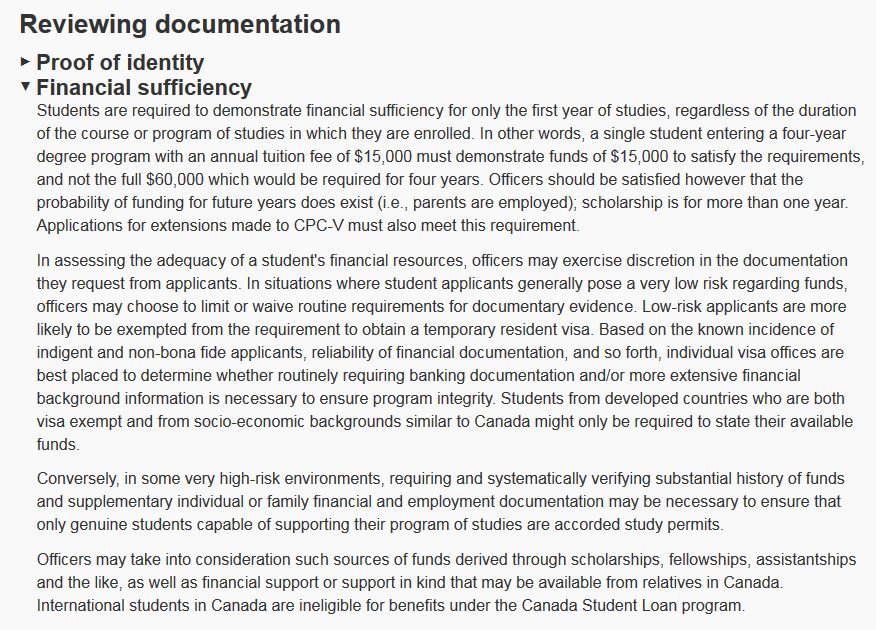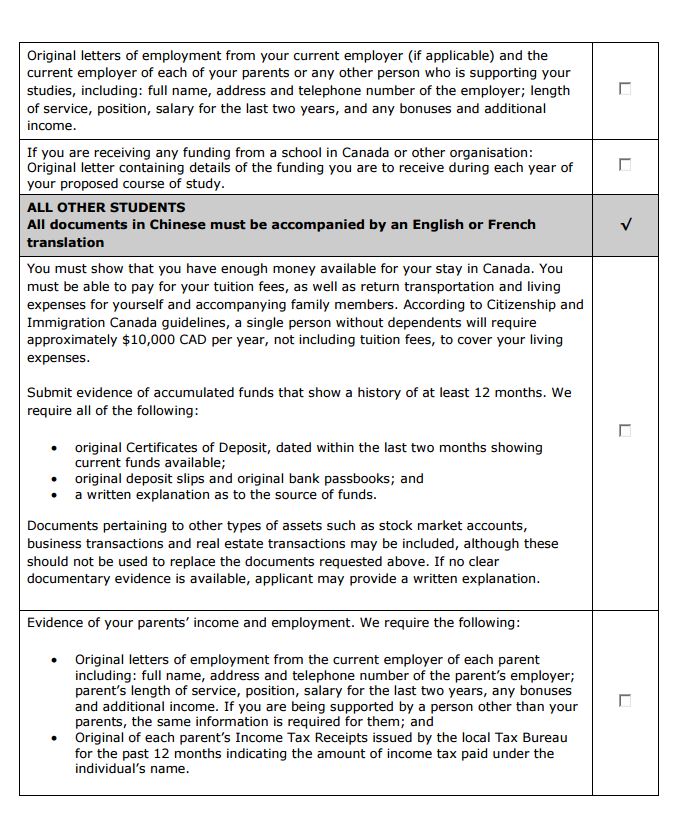Several clients and individuals have been contacting me relating to the issue of financial sufficiency. Studying in Canada is expensive (sometimes prohibitively so), and for several students demonstrating sufficient funds to support studies in Canada will be an issue.
Citizenship and Immigration Canada (“CIC”) Visa Processing Offices Overseas and in Canada all have different requirements as to what constitutes adequate proof of finances. That topic is beyond the scope of this piece (and will be the focus of my next piece actually!)
What I want to tackle in this piece is the amount that is included in the IMM5843/IMM5710 (and ideally explained later) in a Study Permit Application.
How is adequate financial sufficiency calculated?
CIC’s own Study Permits: Assessing the Application Guidelines state as follows (emphasis added):

“Students are required to demonstrate financial sufficiency for only the first year of studies, regardless of the duration of the course or program of studies in which they are enrolled. In other words, a single student entering a four-year degree program with an annual tuition fee of $15,000 must demonstrate funds of $15,000 to satisfy the requirements, and not the full $60,000 which would be required for four years. Officers should be satisfied however that the probability of funding for future years does exist (i.e., parents are employed); scholarship is for more than one year. Applications for extensions made to CPC-V must also meet this requirement.”
What is very interesting is when you compare this to CIC’s Office Training Module (which has not been made public), which states (emphasis added):

Officers must make sure that applicants have sufficient financial resources to pay their tuition fees, transportation costs to and from Canada, as well as living expenses for themselves and any family member who may be accompanying them, without the need to engage in employment.
The above section is somewhat fair. The wording is repeated in some of the country specific checklists, for example China’s:
However, this wording is missing from the general IMM 5483E (11-2015) checklist that is utilized for every visa office:
Importantly, the wording is in the legislative regulations of the Immigration and Refugee Protections regulations at R.220. It states:
Financial resources
220 An officer shall not issue a study permit to a foreign national, other than one described in paragraph 215(1)(d) or (e), unless they have sufficient and available financial resources, without working in Canada, to
(a) pay the tuition fees for the course or program of studies that they intend to pursue;
(b) maintain themself and any family members who are accompanying them during their proposed period of study; and
(c) pay the costs of transporting themself and the family members referred to in paragraph (b) to and from Canada.
The big kicker, is the part that states without the need to engage in employment.
I know that I have seen several study permit applications where counsel/applicants would emphasize that the applicant will be working part-time or possibly that their spouse would find a job and earn X amount of dollars. This line appears to take those factors outside of the Officer’s scope of analysis.
Implications
CIC’s guidelines don’t always seem so crystal clear – particularly when they go beyond their legislative scope into things such as employment as a source of proof. I think Applicants with refusals due to lack of financial resources may want to review the Officer’s analysis and, if they are reapplying, find ways to satisfy the Officer’s Training Module criteria while ensuring to cite the proper legislative framework.
I think also that CIC needs to bring about a little more parity in the way it assesses and provides public information about issues such as financial sufficiency in light of the clear legislative language. Utilizing the same language across all sources – document checklists, visa specific posts, and training manuals would certainly ensure greater consistency.
Please note that the screenshot above titled “Assessment of Funds and Tuition” is derived from an Officer Training Module obtained via Access to Information and Privacy from Citizenship and Immigration Canada. I am not in any way affiliated with Citizenship and Immigration Canada (CIC) nor am providing this information on their behalf or a representative of their organization. I also cannot confirm whether these are and will be the current Training Manual instructions moving forward.


